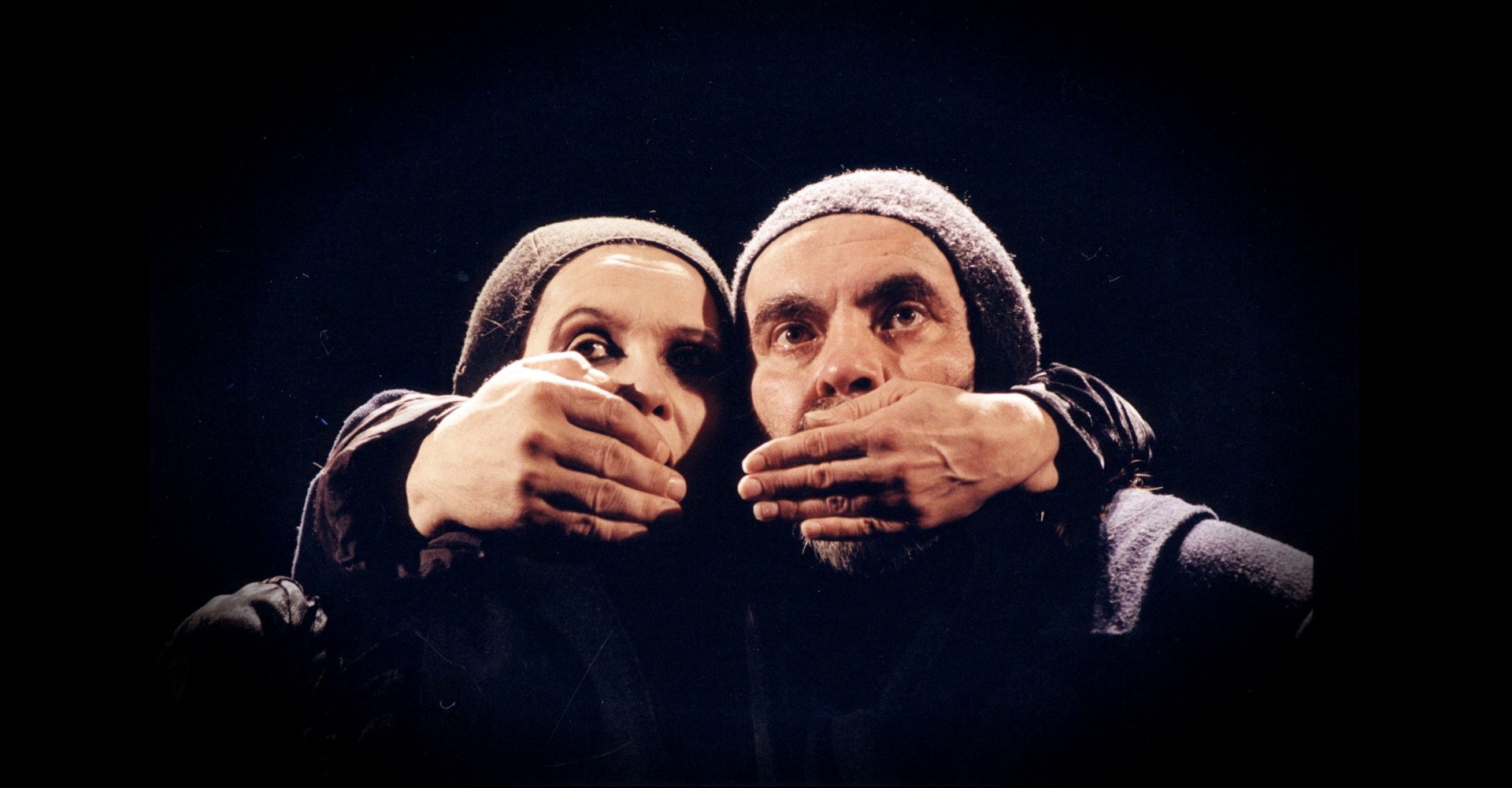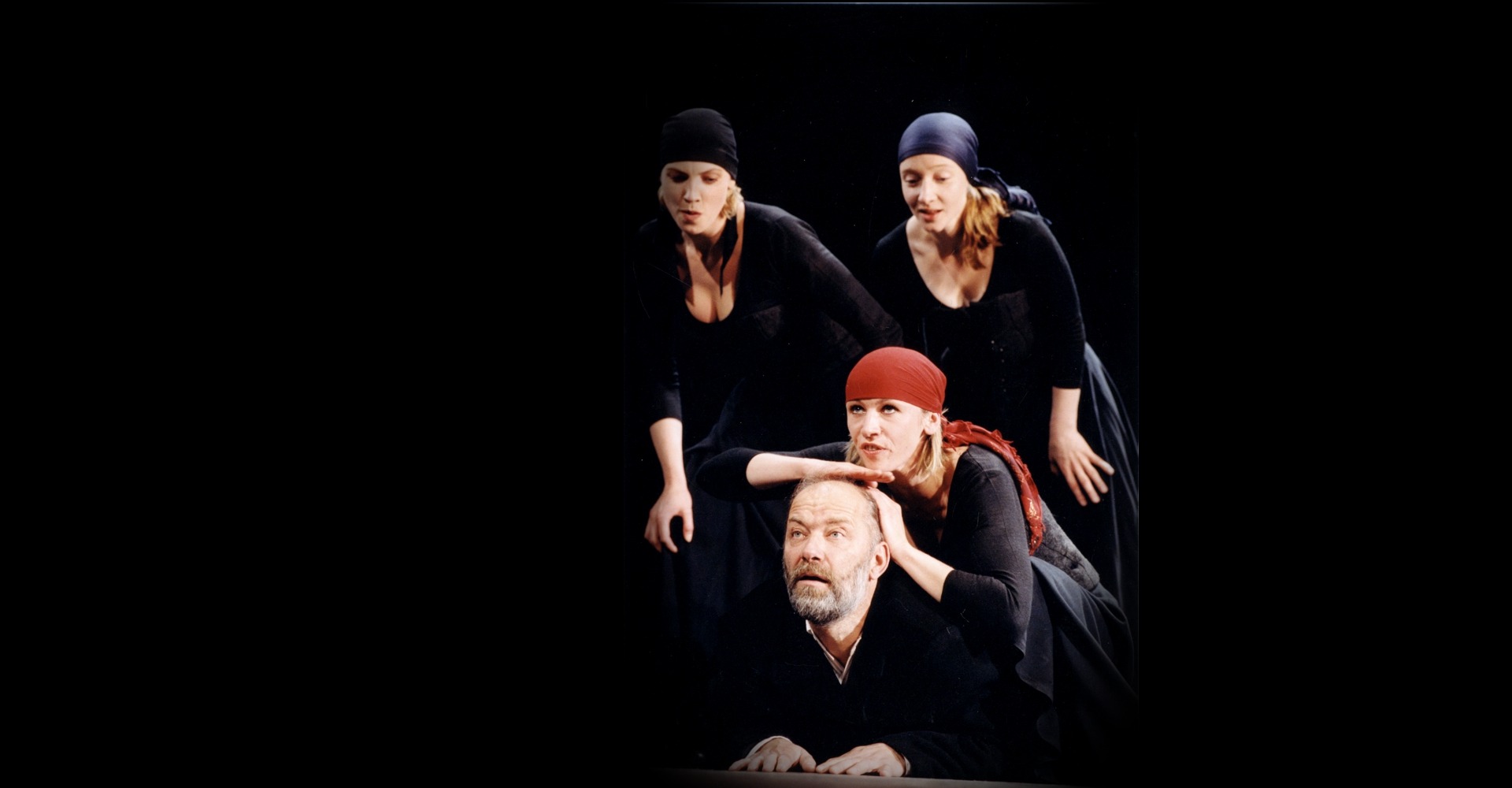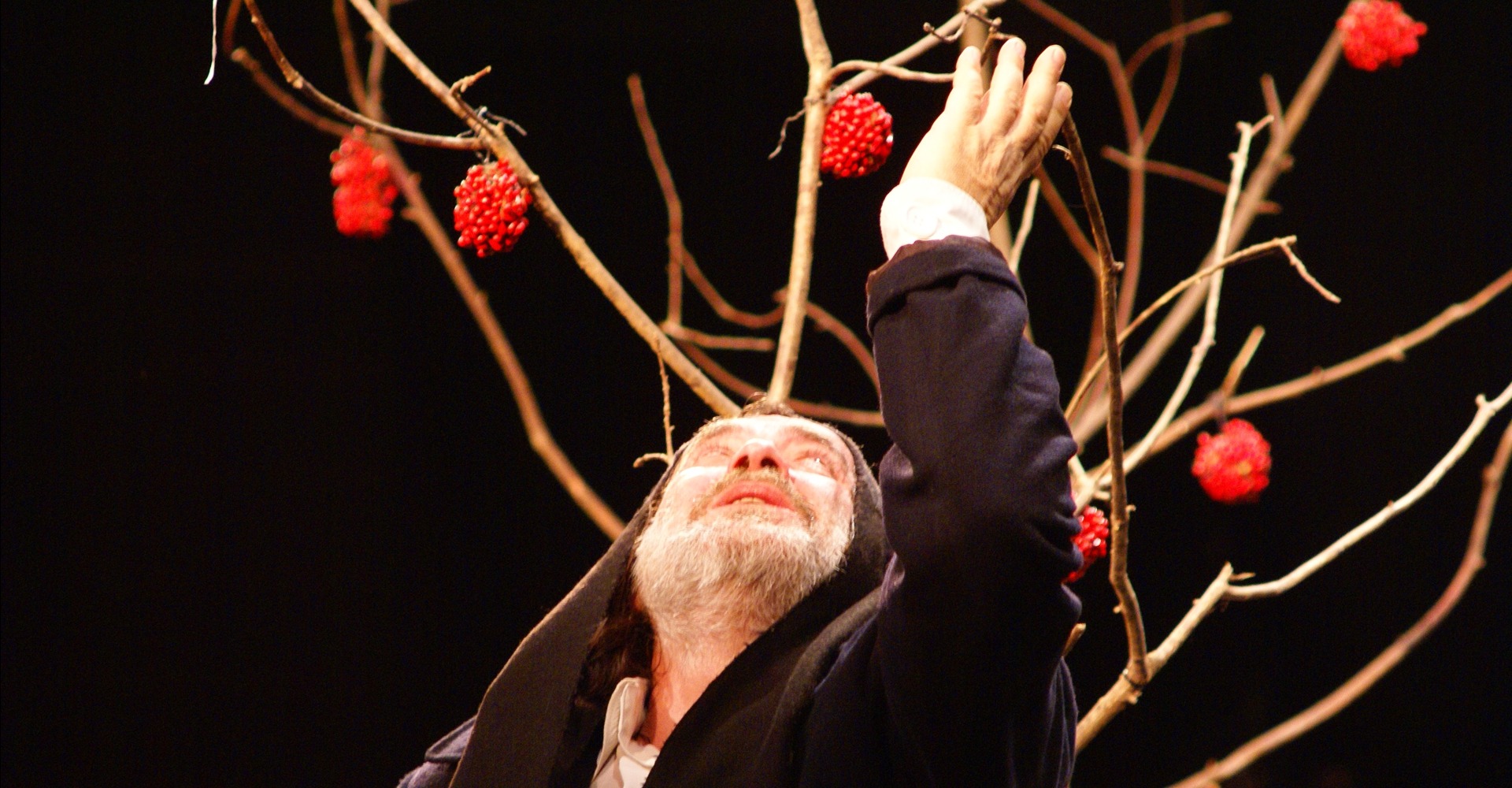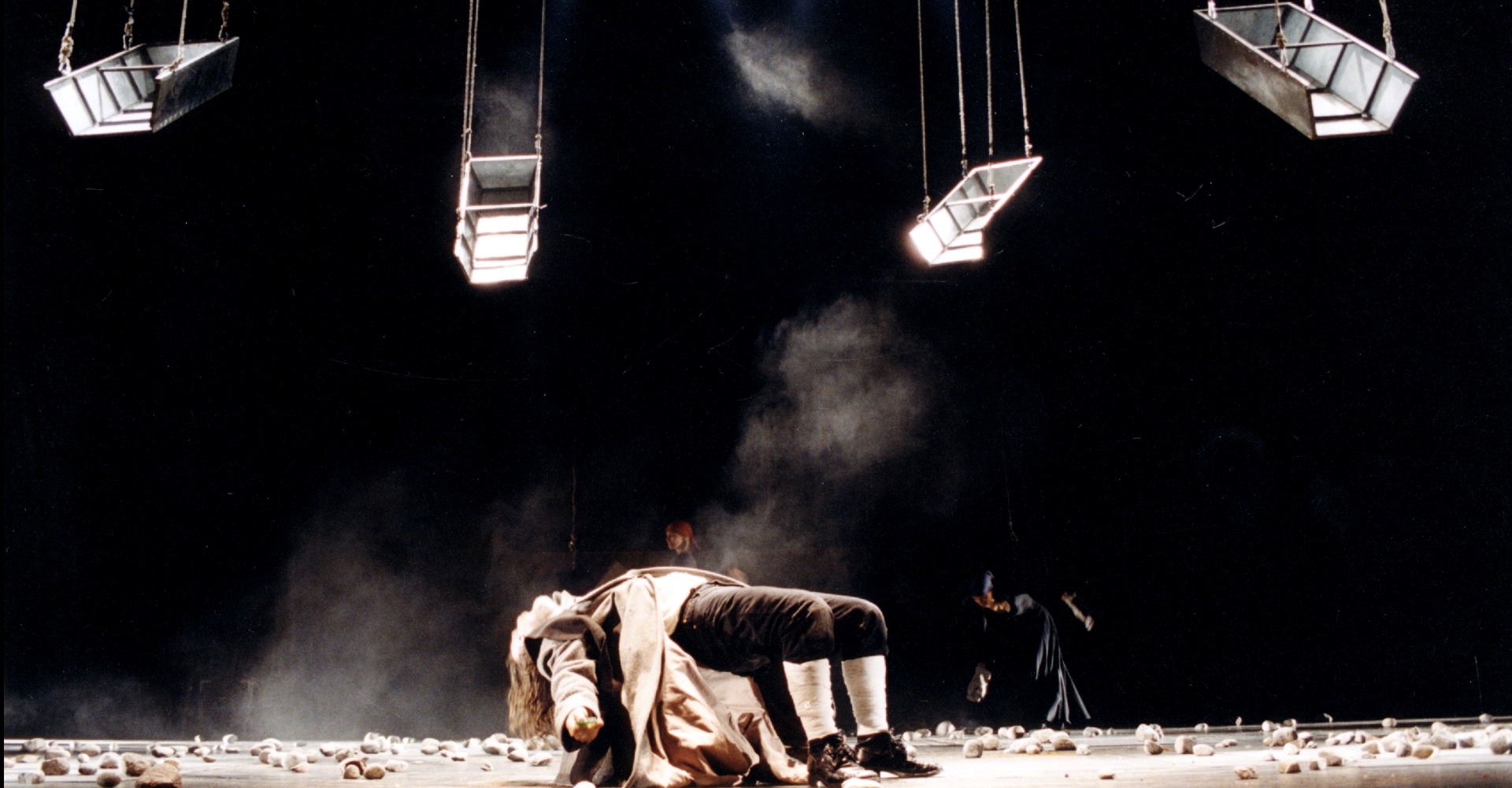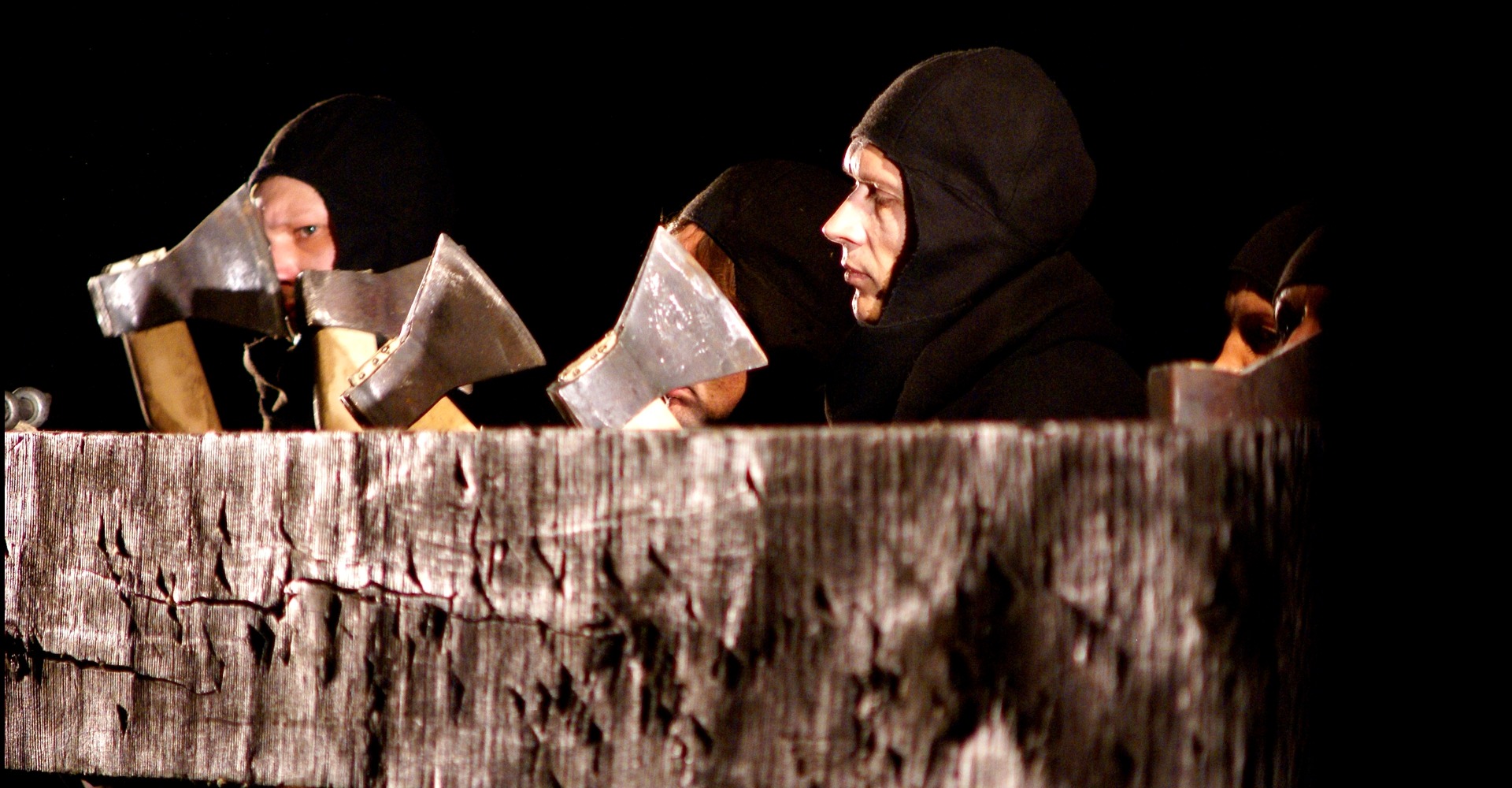This website uses cookies so that we can provide you with the best user experience possible. Cookie information is stored in your browser and performs functions such as recognising you when you return to our website and helping our team to understand which sections of the website you find most interesting and useful.
Macbeth
William Shakespeare
Macbeth
Performance in three parts
Translated by Aleksys Churginas
Opening took place in Lithuanian Academic Drama Theatre in Vilnius on January 22, 1999.
Duration of the performance: 3 hours 50 min.
Produced by Meno Fortas Theatre
Co-producers
Aldo Miguel Grompone
in collaboration with Fondazione Orestiadi ir Festival Palermo‘900
with the support of Lithuanian Ministry of Culture
Director Eimuntas Nekrošius
Set designer Marius nekrosius
Costume designer Nadežda Gultiajeva
Composer Faustas Latėnas
Lighting designer Audrius Jankauskas
Cast
Macbeth Kostas Smoriginas
Lady Macbeth Dalia Zykuvienė–Storyk
Whiches Viktorija Kuodytė, Margarita Žiemelytė, Gabrielia Kuodytė
Banquo Vidas Petkevičius
Duncan Ramūnas Rudokas
Soldiers ant the others
Kęstutis Jakštas, Povilas Budrys, Tomas Kizelis,
Salvijus Trepulis, Dainius Gavenonis, Darius Gumauskas
Stage managers Romas Treinys, Tauras Čižas
Sound designer Rimvydas Gaigalas, Viktor Arefjev, Arvydas Dūkšta
Prop – man Genadij Virkovskij
Technical coordinator Džiugas Vakrinas
Two or Three Things that I Know About Eimuntas Nekrošius’ “Macbeth”
With my thanks to everyone whom I happened to meet during this story
[…]
The first thing that I saw was a cauldron… Eimuntas Nekrošius, having invited me to the still-renovated hall of “Meno fortas” on a sunny day in May, showed it to me. The cast-iron cauldron was dumped upside down in a corner. And a wooden stick lay on the windowsill. Nekrošius lit a cigarette and said, “Such will be Macbeth’s story… made up from a cauldron and a stick… A trap, into which a man stuck his hand…” […]
From a conversation with Eimuntas Nekrošius in November:
“I’m thinking about the final scene of “Macbeth”… A heated iron stove will be brought in, it will emerge out of darkness, and a squeaking metal door will slowly open revealing a burning hell behind it, a thousand degrees of heat… Macbeth realises that it’s the end… He remains alone and is getting ready for his head to be cut. How does Macbeth prepare himself for death? Does he tremble, is he afraid? I don’t think so. Heroically? I don’t think so. Macbeth wasn’t a coward. Neither was he a hero in the traditional sense. I think that all the nicest human qualities should be revealed here. Macbeth is preparing for the guillotine slowly – buttoning his shirt up tightly till the last button, shaving his neck… He accepts death manly and humanly.”
[…]
The theme of fate was already clear – three charming witches were getting more and more dominant with each rehearsal… Now Nekrošius was solving two main puzzles: how to show that a man feels tempted to cross the limit, but is unable to do it? And once the limit has been crossed, how to express his suffering, into which his whole life turns? Because the punishment of fate can never be as terrible as an individual’s confrontation with himself.
The archaic, primitive simplicity was supplemented by a projection of Macbeth’s inner world, to convey which additional means of expression were needed. This is how a system of Macbeth’s visions, reminiscent of a complex development of musical motifs, was born. During the rehearsals this system was created and written down in the form of a musical score.
Yet, Nekrošius imagined that it was impossible to play Macbeth as a character, as in his opinion Macbeth was not a role, but rather a fate that had to be experienced. And he realised that otherwise no theatrical means would be effective… […]
EIMUNTAS NEKROŠIUS: “What do we choose – Macbeth’s heroic challenge to heaven or a human realisation of his weakness? Still, a man is too small, too weak in the presence of heaven… And he wants to share responsibility… To me, looking from the audience’s standpoint, the man in this scene should look sympathetic… His indecision, his inability to kill… I must understand that a man is unable to kill and while preparing the last supper for his friend he shares responsibility – with a mirror…”
A mirror in Macbeth’s hand is not only a metaphor, not only a means to handle the stage space and help the actor to build a system of acting in one of the most complicated scenes of the performance, but also a choice – what is Macbeth.
[…]
Audronis Liuga, “To or Three Things that I Know About Eimuntas Nekrošius’ Macbeth”, Lietuvos teatras, autumn 1998 – winter 1999.
Destined to Ask for Mercy
“Miserere” – “Have mercy” – in the final scene of “Macbeth” sings everyone who has remained on stage. Witches, soldiers, the killers and the killed. Macbeth has just been punished in their presence. His destiny was to be deprived of his head. What else if not his head, in which so many bloody ideas were born, is now steaming in a huge cauldron? […]
The beginning of the story was quite unthreatening. The sky was clear. Just three impish witches with a devil’s cauldron on their hips were looking for a new hero for their prophecies. Who will become their toy – a toy of destiny? Whose life are they going to provoke while giggling, fooling around and as if apologising, because they themselves are someone else’s toys?
[…]
“Macbeth” directed by Eimuntas Nekrošius is reminiscent of a choreographic musical drama.
The choreography of each role, each movement in any point of the stage, the presence of an actor or an object, each sound – musical phrase, knocking or breathing – is part of the director’s precise and clear drawing. This drawing is flexible and does not restrict either the actor or the perceiver. Another thing is that you may not catch up with the director’s thought, as each moment is full of action, slow but intense.
Words. This time there are lots of them, thought Shakespeare wrote maybe ten times more. He probably did not imagine how much can be said in images. For example, the trees in the backpacks of Banquo (Vidas Petkevičius) and Macbeth […]. Later the ghost of the killed Banquo will turn up at Macbeth’s royal feast as the same tree in Banquo’s backpack. Or a hail of stones from four metal coffins above. Or reflections in the mirrors: the disappearing Duncan, Lady Macbeth watching over a deadly deed, a dagger convincing Macbeth to kill … And how many mirrors were broken in the first act by the witches gone wild?
[…]
The final scene. When in front of a steaming cauldron all the characters who have remained alive ask for mercy, the music by Faustas Latėnas stops for a moment. But soon it resumes with even greater intensity, and spotlights are turned at the audience. Let’s pray for ourselves. Macbeth’s lesson is addressed to everyone.
[…]
Rūta Oginskaitė, “Destined to Ask for Mercy”, Mūzų malūnas No. 4 (376), 1999
Macbeth’s Absurd Relic
This important theatre text is communicated only by the wind of energy that is whistling in the depths. This whirl of energy enthrals us unfolding the full force of the talent of the great master of imagination, Lithuanian director Eimuntas Nekrošius, who blends together his actors’ fatigue, concentration and movements on stage. […]
Eimuntas Nekrošius has accustomed us to miracles. It is enough to recall the gloomy barbarian splinters of ice and fire in “Hamlet” […]. Each time Eimuntas Nekrošius leaves some space for one more meditation, one more astounding realisation.
In this performance the inner action of Macbeth and his bloody crown is seen, reflected and dreamt as if in a dark mirror – it is a tragedy of a sombre individual bound to decay among the dark forces. The essential void on “Macbeth’s” stage is even more distinct than in other performances of Nekrošius’ saga. It becomes clear that it is perceived as such by the individual impelled to act by the weight of concrete symbols: rhythmically swaying square logs, beats of an axe chopping wood reminiscent of impending death, the avalanche of stones rolling towards Macbeth on the stage like an approaching catastrophe.
At the beginning of the performance a man-tree – the vegetal Macbeth – appears like an impossible unique harmony and slowly gets closer to his visions and a distorted oppressing reality, up to the limit of his existence.
A trio of witches – three blonde Nordic girls, ready to rule everything what is taking place on stage. Their cauldron, turning and rolling around thousands of times, becomes a misleading centre of the stage.
The forceful Macbeth played by Kostas Smoriginas slowly deteriorates without ever ceasing to think about the senselessness of his life. Sometimes Macbeth looks like Wojcek who hears voices, and sometimes like Beckett’s Nameless tortured by his loneliness. The action takes place among rugs into which people-relics are enveloped, thrones-catafalques and intersecting mirrors reflecting crawling shadows with a spectrum of shining lights.
Enchantingly terrible is Dalia Storyk’s spectre, which is bound to disappear, having provoked Macbeth to murder. Macbeth’s punishment is implacable like an armed forest moving towards him. Macbeth’s head will fall not in a battle, but under a guillotine. Meanwhile, “Miserere” aligns everyone into a row of graves in the truly unforgettable final scene.
Sergio Colomba, “Macbeth’s Absurd Relic”, Il Resto del Carlino, November 20, 1999
Hang upon His Pent-House Lid
Eimuntas Nekrošius’ “Macbeth” has appeared from insomnia. Though this statement may be an oversimplification, but it is necessary while trying to realise or interpret the whole. One should choose an aspect, an edge, or a point of reference. All the more that everything seems to be so simple and still ineffably complicated. […]
“Macbeth” is dominated by the most oppressive and intimate human state – insomnia that knows no secrets. It gnaws at one’s consciousness and tosses one into an abyss of “black and deep desires”, conjures “horrid images”, “shakes so [his] single state of man”, invokes witches and ghosts and gives birth to “intangible pictures”. It is a state in between the real and the apparent, between this and another world, between sleep and death.
The succession of images and sounds in the performance yields to this ambiguous state and reflects it. “Macbeth” has been assembled from various reflections of consciousness: pangs of conscience, feverish impulses, doubts and fears. Here an action looks like an intention, and an intention – like an action. A hero tormented by insomnia surrenders to a somnambulist stream that paralyses the will, moves the body and tears the soul. […]
“And nothing is/but what is not”, – it is a phrase from Macbeth’s first monologue delivered by Kostas Smoriginas with his head upside down. He no longer belongs to himself and is unable to “yield to that suggestion whose horrid image doth unfix my hair” (one of the most beautiful examples of how Nekrošius gives a visible shape to words), and is led by a voice from another world: an even, deep and indifferent woman’s voice from offstage. This voice as if reads Macbeth’s thoughts, anticipates them, makes him repeat them and as if encourages him, “Thus thou must do”.
However, the spell is cast in the prologue of the performance, when the witches, infected with the spirit of playing, set a fatal trap to him, not yet knowing who will fall into it – Macbeth or the cautious Banquo:
I will drain him dry as hay:
Sleep shall neither night nor day
Hang upon his pent-house lid;
He shall live a man forbid.
This softly sung incantation sends the victim to a spiritual hell. But which victim? Fate is blind, and it chooses Macbeth by accident. This interpretation seems to be close to the director, and in the scene of prophecy he imperceptibly replaces the accents of the drama. […]
The dice is thrown, the fate is decided and the way back is cut off. The incantation confuses one’s soul, brings to the surface the dark forces of nature and kills sleep. Sleep gives rest only to those who have not been touched by temptation. […] The end of the first act and one half of the second act is an oppressive succession of Macbeth’s contradicting states, hallucinations and mirror reflections. Macbeth’s nature is “too full o’ the milk of human kindness”, an abyss of metaphysical horror is revealed in his monologues, but he is pushed into his terrible goal, like Lady Macbeth pushes a hardly moving table.
Linas Vildžiūnas, “Hang upon His Pent-House Lid”, Lietuvos teatras, autumn 1998 – winter 1999
Caress with Fists
[…]
The weather in “Macbeth” is quite Lithuanian. You go out ready for winter, with nice warm mittens, and come back soaking wet. When Macbeth played by Kostas Smoriginas comes to the stage and wrings out his drenched mittens, you repeat to yourself with firm conviction: yes, the director Eimuntas Nekrošius is a very consistent hyper-realist, who brings to the stage – like Macbeth brings a tree in his backpack – his striking ability to make “foul weather” tangible, even irritatingly recognisable. It is difficult to find space for additional compliments on this theme. As well as for faults. […]
What did Shakespeare have in mind when he put on the witches’ lips the words: “Fair is foul and foul is fair”? He undoubtedly spoke about time – lightly, clearly and without looking for new dramatic forms. Having pronounced this statement, he consistently developed it in four acts. It seems that Eimuntas Nekrošius does not try to invent the bicycle and say something that we do not know. All times are similar. And thus the director creates one more production from the materials already tested in the “construction” of the world – wood, metal, stone and Shakespeare. The most necessary objects are a dagger, an axe, a wine glass and a pillow to rest one’s head on it. And a rope. For a witch – to put it on her waist, for another character – to hang an axe on it, for Nekrošius – to sway a log on it. […]
But maybe the witches are not such great philosophers and in fact they were talking about the theatre, about Macbeth as a character? Kostas Smoriginas is charming by nature – by his talent, temperament, spontaneity, and finally by his image […]. But he must be terrifying. That what has been prophesised is foul, but for us in the theatre it should look fair. […]
It is said that fate is playing with us, in the sense that it is theatricalized. One has an impression that theatre in Macbeth does not allow Macbeth to be himself, to have a rest, to feel and think by himself. […]
Theatre intrudes on Macbeth disguised as his inner – female – voice, which makes him believe that it is his nature that incites him to kill. And finally it gets the upper hand in the scene with a mirror and becomes inseparable from Macbeth. […]
The witches or court maids never stop beckoning, giggling, agreeing or disagreeing. The drama of existence, according to Nekrošius, is the fact that man is never left alone. On this side. […]
Nekrošius’ man is a controlled, dependent and unhappy creature. Yes, the road to hell is more terrible that hell itself. But it is on this road that Macbeth must walk and bear with it, accompanied by his fears. Which means that he must be brave. These tasks have been raised for the leading actor Kostas Smoriginas and for Dalia Storyk playing Lady Macbeth. This couple, when staying together, is reminiscent of one person and remind us of Siamese twins. Their caress with fists is a very strong, generalising and rich metaphor of human intimacy. […]
Rasa Paukštytė, “Caress with Fists”, Literatūra ir menas No. 5 (2729), 1999
